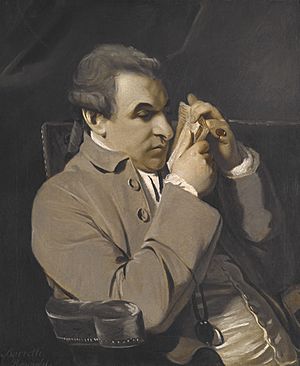Giuseppe Marc'Antonio Baretti facts for kids
Quick facts for kids
Giuseppe Marc'Antonio Baretti
|
|
|---|---|

Joshua Reynolds, Portrait of Joseph Baretti, Indianapolis Museum of Art
|
|
| Born | 24 April 1719 Turin, Duchy of Savoy |
| Died | 5 May 1789 London, Great Britain |
| Occupation | Lexicographer, poet, playwright, translator, literary critic, writer |
Giuseppe Marc'Antonio Baretti (born April 24, 1719, in Turin, Italy – died May 5, 1789, in London, England) was a very talented Italian writer. He was a critic, poet, and translator. He also created two important dictionaries for learning languages. In England, people often knew him as Joseph Baretti. His life had many challenges, which led him to leave Italy and live in England for the rest of his days.
Contents
Baretti's Early Life and Travels
Giuseppe Baretti's father wanted him to become a lawyer. But when Giuseppe was only 16, he left his home in Turin. He went to a town called Guastalla and worked in a trading business for a while.
Becoming a Writer and Critic
Baretti spent his time studying literature and how to analyze books and writing. He became very good at it. However, his writings often caused arguments. Because of this, he had to leave Italy. For many years, he traveled around, earning money mainly by writing.
Life in London
Eventually, Baretti arrived in London, England. He stayed there for the rest of his life, except for his travels. He became the Secretary for the Royal Academy of Arts. He also met famous people like Samuel Johnson and David Garrick.
Baretti often visited the home of Hester Thrale, a well-known writer. His name appears many times in a famous book called Boswell's Life, which is about Samuel Johnson.
A Street Incident
In 1769, Baretti was involved in a street incident. During an argument, he used his fruit knife, and someone was hurt. Baretti was later cleared of any wrongdoing. Samuel Johnson and others spoke up for him during the trial.
Baretti's Final Years
Giuseppe Baretti passed away in London in May 1789. He was buried in Marylebone Chapel. A monument by the sculptor Thomas Banks marks his resting place.
Baretti's Important Works
Baretti wrote many books and articles. His first important book was Italian Library (1757). This book was a helpful list of Italian authors and their works.
Travel Journals
His Lettere famigliari (Family Letters) were very popular. These letters described his travels through England, Portugal, Spain, and France between 1761 and 1765. When they were published in English in 1770, Samuel Johnson praised them highly.
Literary Criticism
While traveling in Italy, Baretti started a magazine about books and writing called Frusta letteraria (Literary Scourge). This publication faced many problems and stopped being printed soon after it started.
Baretti was also known for his strong opinions. He wrote a very critical attack on an English writer named John Bowle. This attack was called Tolondron. It was about Bowle's edition of Don Quixote and also talked about Spanish literature.
Dictionaries and Other Writings
Baretti created many other works. These include:
- A Dictionary and Grammar for the Italian Language.
- A similar Dictionary for the Spanish Language.
- Essays about famous writers like William Shakespeare and Voltaire.
His collected writings were published in Milan in 1838.
Galileo's Famous Quote
Baretti was the first person to write down the famous words attributed to Galileo Galilei: "eppur si muove" (meaning "nevertheless it moves"). Galileo supposedly said this quietly to himself. Baretti recorded this about 125 years after Galileo might have said it.
 | Valerie Thomas |
 | Frederick McKinley Jones |
 | George Edward Alcorn Jr. |
 | Thomas Mensah |

